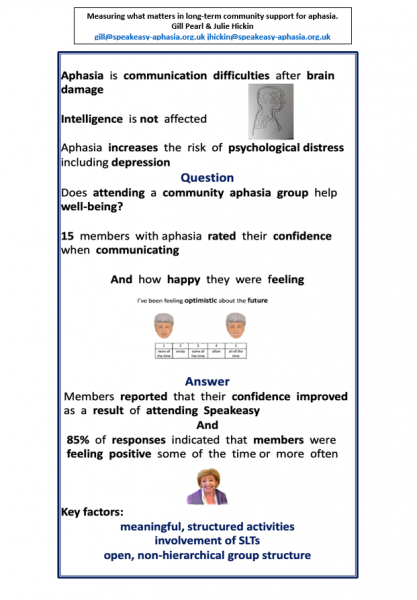Measuring what matters in long-term community support for aphasia.
Gill Pearl & Julie Hickin
gill@speakeasy-aphasia.org.uk jhickin@speakeasy-aphasia.org.uk
Introduction: This poster reports on an aspect of a larger service evaluation project for a local community aphasia group (CAG) – Speakeasy. Aphasia affects the ability to communicate and is caused by brain damage. Recent research demonstrates that having aphasia significantly increases the risk of psychological distress1. However, there are very limited services available to support the mental health of people with aphasia (PwA) 2. Speakeasy is one such service which offers purposeful therapeutic activity, co-created by SLTs and members within a goal orientated framework. This project assessed the impact of group attendance on well-being of PwA, as well as investigating its impact on carers and how NHS SLTs perceived it as supporting their service.
Methods: This small-scale study used a mixed methods design and a purposive sample of members with aphasia (PwA n=15). This represents a significant undertaking as assessment with members with aphasia was more time consuming to ensure that they understood both what they were being asked and that they were facilitated to express their responses3. Well-being was investigated using the Communication Confidence Rating Scale (CCRS)4 and the Warwick-Edinburgh Mental Well-Being Scale (WEMWBS)5 with these two measures chosen because they foster positive emotions. Members also participated in semi-structured interviews.
Results: Completion of the CCRS indicated that members reported improvements in confidence as a result of attending Speakeasy, including when communicating with friends and family and when participating in activities of daily living. Completion of the WEMWBS was also indicative of a positive impact of attending Speakeasy, with 85% of responses indicating that members were feeling positive some of the time or more often.
Conclusions: This small-scale study represents indicative evidence that attendance at a CAG can have a positive impact on the well-being of PwA, and is the first study to assess this directly. The wider evaluation also identified the importance of support for carers and the provision of information, whilst NHS SLTs perceived Speakeasy as supporting discharge of PwA and facilitating the achievement of SLT goals in real life. There is a need for larger scale and more extensive research on the mental health needs of PwA, including the development and validation of tools to assess this, and consequent development of appropriate support services.
References.
- Baker, C., Worrall, L., Rose, M., & Ryan, B. (2020). ‘It was really dark’: The experiences and preferences of people with aphasia to manage mood changes and depression. Aphasiology, 34(1), 19-46. doi:10.1080/02687038.2019.1673304
- Royal College of Physicians. (2017, December 04) Sentinel stroke national audit programme (SSNAP) clinical audit April – July 2017 Public report. Available at: https://www.strokeaudit.org/Documents/National/Clinical/AprJul2017/AprJul2017-PublicReport.aspx [Accessed: 11 March, 2021].
- Pearl, G. (2014). Engaging with people who have aphasia: A set of resources for stroke researchers. National Institute for Health Research Clinical Research Network: Stroke.
- Babbitt, E.M. & Cherney, L.R. (2010) Communication Confidence in Persons with Aphasia, Topics in Stroke Rehabilitation, 17, 3, 214-223, https://doi.org/10.1310/tsr1703-214
- Maheswaran, H., Weich, S., Powell, J. et al. Evaluating the responsiveness of the Warwick Edinburgh Mental Well-Being Scale (WEMWBS): Group and individual level analysis. Health Qual Life Outcomes 10, 156 (2012). https://doi.org/10.1186/1477-7525-10-156
